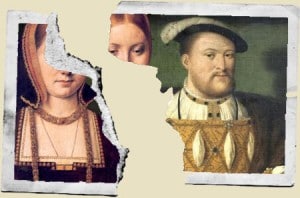 On 5th April 1533, Convocation gave its ruling on Henry VIII’s marriage to Catherine of Aragon, stating that the Pope had no power to dispense in the case of a man marrying his brother’s widow, and that it was contrary to God’s law.
On 5th April 1533, Convocation gave its ruling on Henry VIII’s marriage to Catherine of Aragon, stating that the Pope had no power to dispense in the case of a man marrying his brother’s widow, and that it was contrary to God’s law.
Here is the record from Letters and Papers:
“Notarial attestation of the determination of the Convocation of Canterbury, begun 5 Nov. 1529, on the two points discussed in the King’s divorce, determining, 1, that the Pope has no power of dispensing in case of a marriage where the brother’s widow has been cognita. The house consisted of 66 theologians. The proxies were 197; the negatives 19. The second question was, whether Katharine was cognita. The numbers present, 44 ; one holding the proxies of three bishops. Decided in the affirmative against five or six negatives. Dated 5 April 1533.”
This ruling from Convocation was followed by a trial at a special court which opened on 10th May 1533 at Dunstable Priory, Bedfordshire, to examine Henry VIII’s case for the annulment of his first marriage. It was presided over by Thomas Cranmer, the newly consecrated Archbishop of Canterbury, and he announced the sentence on 23rd May 1533, declaring the marriage to be “against the law of God” and ‘divorcing’ the King from Catherine.
Notes and Sources
- Letters and Papers, Foreign and Domestic, Henry VIII, Volume 6, 1533, 311.
- MacCulloch, Diarmaid (1998) Thomas Cranmer: A Life, p93-94.
- Kelly, Henry Ansgar (2004) The Matrimonial Trials of Henry VIII, p206-210.
- LP vi. 525, Letter from John Tregonwell to Cromwell, 23rd May 1533.
- Ibid., 529.
- Scarisbrick, J.J. (1997) Henry VIII, Yale English Monarchs, Yale University Press, p. 312.